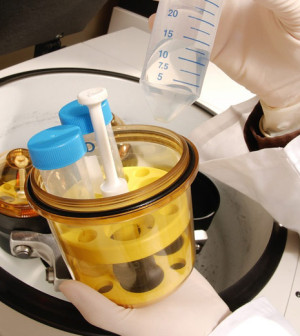- 8 Ways to Increase Dopamine Naturally
- 7 Best Breads for Maintaining Stable Blood Sugar
- Gelatin vs. Collagen: Which is Best for Skin, Nails, and Joints?
- The Long-Term Effects of Daily Turmeric Supplements on Liver Health
- Could Your Grocery Store Meat Be Causing Recurring UTIs?
- Are You Making This Expensive Thermostat Error This Winter?
- Recognizing the Signs of Hypothyroidism
- 10 Strategies to Overcome Insomnia
- Could Artificial Sweeteners Be Aging the Brain Faster?
- Techniques for Soothing Your Nervous System
Smokers Have Higher Complication Risk After Colon Surgery, Study Finds


FRIDAY, Sept. 27Smoking increases the risk of complications and death following colorectal surgery, a new study says.
The study is based on an analysis of data from 47,000 patients in the United States who had major, non-emergency colorectal surgery. Researchers from the University of Rochester Medical Center in New York found that smoking raised the risk of complications such as pneumonia and other infections by about 30 percent.
“Anecdotally, we know that many patients don’t take the opportunity to quit or join a smoking cessation program before surgery,” study lead author Dr. Fergal Fleming, an assistant professor in the department of surgery, said in a university news release.
“We want to find out what motivates patients, how can we make them a major player in their own care, and how can we as physicians do a better job of explaining issues like this to patients,” Fleming explained.
The study, published in the August issue of the journal Annals of Surgery, looked at 26,000 patients who had surgery for colorectal cancer, 14,000 operated on because of diverticular disease (small, inflamed pockets that form along the colon wall), and 7,000 who had surgery for inflammatory bowel disease.
Twenty percent of the patients were current smokers, 19 percent were former smokers and the rest had never smoked.
After taking age, body fat, alcohol use and other health conditions into account, the researchers concluded that current smokers still had an estimated 30 percent higher risk of dying or developing complications following colorectal surgery compared to those who never smoked.
Current smokers — who were younger than ex-smokers and never-smokers — had the highest rates of pneumonia and infection, were more likely to require additional surgery and had much longer hospital stays, the researchers said.
They also found the rates of all complications and the risk of death were significantly higher in patients who smoked two packs a day for more than 30 years.
More information
The American College of Surgeons has more about smoking and surgery.
Source: HealthDay
Copyright © 2026 HealthDay. All rights reserved.










